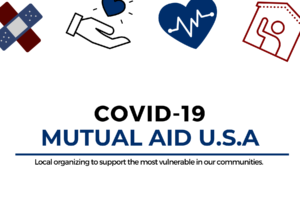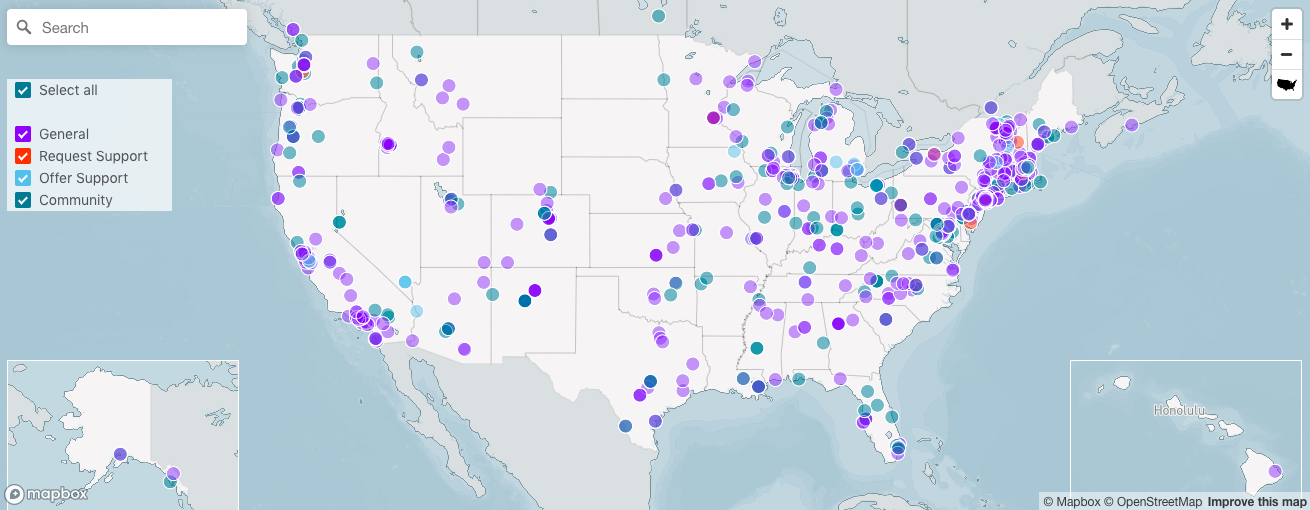
Life in Quarantine: Witnessing Global Pandemic is an initiative sponsored by the Poetic Media Lab and the Center for Spatial and Textual Analysis at Stanford University.

What is mutual aid? It refers to inherently political, community-centered, and community-led effort in which people take responsibility for caring and assisting others in their local areas in times of crises. It is most common to see such efforts sprout up when it becomes clear to people that limited or no help will come from government institutions. Since March, the United States, as well as many nations around the world, have seen a spike in these empowered mutual aid funds. People tend to know what they need and how they can best be helped. This people-centric approach is key to our goal of Life in Quarantine: Witnessing Global Pandemic.
Documenting community-led efforts and horizontal, opposed to top-down, responses aligns with the heart of our project in documenting first-hand experiences. Rarely are such endeavors thoroughly documented, despite the myriad of crises since the proliferation of the internet use, which deeply facilitates and expands these networks of support. Due to the global magnitude of this virus, the recent mutual-aid response is unprecedented in its scope. Thanks in large part due to social media, the visibility of these mutual aid funds has created a domino effect in which people see the creation of a mutual aid fund in a nearby state or city, and are then inspired to start their own to support their community in need.
Below is an image of a map that shows mutual aid organizations across the United States, which can be accessed via the Mutual Aid Hub. It reveals the extent to which mutual aid organizations have begun to appear around the country in response to the lag by local and federal bodies to appropriately respond to their citizens during the pandemic. We deeply encourage you to check to see if there is a mutual aid organization in your community where you might be able to lend a hand. Alternatively, if your community needs assistance where there is none, consider starting your own! While this may sound daunting at first, feel free to reach out to us and we can connect you to others who have done exactly that; started neighborhood, community, city or state organizing efforts from zero.

Mutual aid testimonies (from volunteers) help shed light on the inner workings of such organizations, their perceptions and experiences, as well as the challenges faced by those they are helping. Unlike capitalist forms of assistance such as philanthropy and charity, mutual aid funds center around the community helping themselves rather than those with privilege giving (parameterized) resources to disadvantaged folks. Through these stories of volunteers and those connected with mutual aids, we can gain insight into what a post-COVID-19 world might look like. Only time will tell.
"We want to break down the silos of how Americans are taken care of. America used to be different; neighbors used to help each other, and now we've allowed government and nonprofits to step in and take away our power. And now they don't even want to care for us at this critical time. It's time for community to care for itself again."
Aram Ayra, Riverside Mutual Aid
“It’s presumed some people will be haves and others will be have-nots, but there’s never a discussion of a solution. We want to demolish that dynamic where those with privilege have all the power to help, where the community could mutually help itself.”
Ashley, Las Vegas Mutual Aid
Ultimately, we have committed ourselves to tracking these developments, gathering testimonials from those who organized them, and helping to show the magnitude of the rise of such mutual aid funds that have surfaced in the past couple of months out of sheer need. We also plan to continue forging connections with more initiatives and relief funds that align with creative endeavors, as many artists have lost work and income during this pandemic.
We are deeply indebted to the stories that these organizers from mutual aid organizations and relief funds have shared with us.
Please take a look below to see testimonials from the Riverside Mutual Aid Organization, Las Vegas Mutual Aid Organization, and the Academy of American Poets & their partners by hovering over the “Life in Quarantine Images” to the left of “Click Here to Share Your Testimonial” button. Speaking of which, if you yourself are an organizer or volunteer of a mutual aid fund or relief fund, or know someone who is, please either submit a testimony about your experience or forward the link for submission onward! Thank you!
Life in Quarantine: Witnessing Global Pandemic is an initiative sponsored by the Poetic Media Lab and the Center for Spatial and Textual Analysis at Stanford University.
Center for Spatial and Textual Analysis (CESTA),
Stanford University
Address:
4th floor, Wallenberg Hall (bldg. 160)
450 Jane Stanford Way
Stanford, CA 94305
Stanford Mail Code: 2055